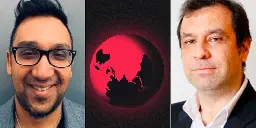Debating the transition | Simon Michaux & Nafeez Ahmed (podcast)
Debating the transition | Simon Michaux & Nafeez Ahmed (podcast)
Listen now | So do we have enough materials for a renewable economy or not?

Episode description
On YouTube: https://youtu.be/2-Ga3UNp3vE
“Exactly when we are experiencing these really huge environmental challenges, ecological challenges, energy challenges, food challenges, social and political crises, all of these converging at the same time—which suggests that there's something deeply, fundamentally wrong with the prevailing paradigm, that we're moving through this moving through the eye of the needle—it's an evolutionary moment in a way where we are under extreme stress and the information that we need to make sense of all of this is very, very polarised.
And one of the things we learned from this is that our existing information systems, the way that we think, the way that we process information in our societies as communities, as institutions, as individuals, isn't really working. We've never had more information. We've never had more data ever, but the ability to kind of make that information coherent so that we have an understanding of our situation seems to be in some ways declining. We are not able to keep up with the avalanche of information. And I think Simon and I both recognise that, and are trying to get some kind of a handle on that.”
A few months ago, the energy-Twittersphere exploded into debate over Simon Michaux’s report detailing how we lack enough materials and minerals for a renewable economy. I interviewed Simon, a researcher at GTK Finland, about this report, in which he laid out the lack of raw materials and the ecological cost of mining which will impede a renewable energy future.
The report was divisive, with anyone and everyone weighing in on the debate, and more than some name-calling online. Nafeez Ahmed, a systems researcher and investigative journalist who has been reporting on the environment for 20 years, published a detailed piece “debunking” Simon’s report. It caused another stir online, with calls for a debate between the two tweeted from around the world.
Watching this unfold, I was concerned by how those on the same side of the fight can end up at odds, and bemused by the vitriol I witnessed on Twitter in both Simon and Nafeez’s name. Simply, if we can’t learn to speak with one another, what’s the point?
They were both quick to agree to a debate, and had already been engaging over email on the topic. We go into the technical details of the report but also discuss the polarisation of science, the processing of information, the politics and tribalism driving conversation, before exploring the benefits of how an energy transformation can truly transform society.